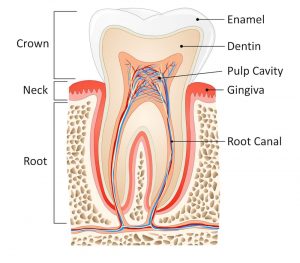If you are missing all or nearly all of your upper and/or lower teeth, dentures are generally the best option for tooth replacement. Conventional dentures are removable and form a seal through suction with your gums. A skilled dentist can create comfortable and natural-looking conventional dentures and this is a great option for many patients. However, implant dentures may be a better fit depending on your situation. These are rows of artificial teeth that are secured in place using dental implants, which are titanium posts that are surgically placed in your jaw and act as an artificial tooth root.
Here are some of the benefits of implant-supported dentures:
Support a Healthy Jaw
Losing your teeth means that the roots are no longer stimulating your jaw. This can lead to bone resorption, a process where the body absorbs bone tissue in the jaw that is no longer being used. Bone loss can change the shape of your gums and face. Conventional dentures are not as effective at preventing this because the pressure that chewing with dentures exerts on your jaw is significantly less than it would be with natural teeth. Dental implants can help prevent bone loss and support jaw health.
Eat Comfortably
Conventional dentures may slip around in your mouth while you eat. This is especially common for lower dentures since there is less surface area for them to adhere to your gums. The movement of your dentures may make eating certain foods difficult and can make you self-conscious eating around others. Implant dentures have solid support and won’t move around, so you can enjoy all of your favorite foods.
Speak More Easily
In addition to making it harder to eat some foods, dentures that slip around in your mouth can result in trouble speaking. This can impact your confidence and is often frustrating for patients. Implant-supported dentures may make it easier to talk and pronounce sounds that are difficult with conventional dentures.
Longer Lasting
Conventional dentures typically need to be replaced every 5-8 years, whereas implant dentures can last for 20 years or more with proper care. This makes them a great investment in the long run.
Smile with Confidence
We can create beautiful implant dentures that look natural. In addition to the functional benefits of tooth replacement, one of the biggest positive outcomes is the renewed confidence that many patients feel.
The Process of Getting Implant Dentures
If you are interested in getting implant-supported dentures, your dentist can go over the process in detail. We will work with a trusted oral surgeon for your dental implant surgery and will support you throughout the process. Although you will need to wait for your implants to fully integrate with your jaw bone before we place your permanent implant dentures, we can create a temporary denture so you can enjoy your new smile sooner.
Restorative Dentistry at Smith Dentalworks
At Smith Dentalworks, we can help you get your smile back. There are many options available, including conventional and implant-supported dentures.




